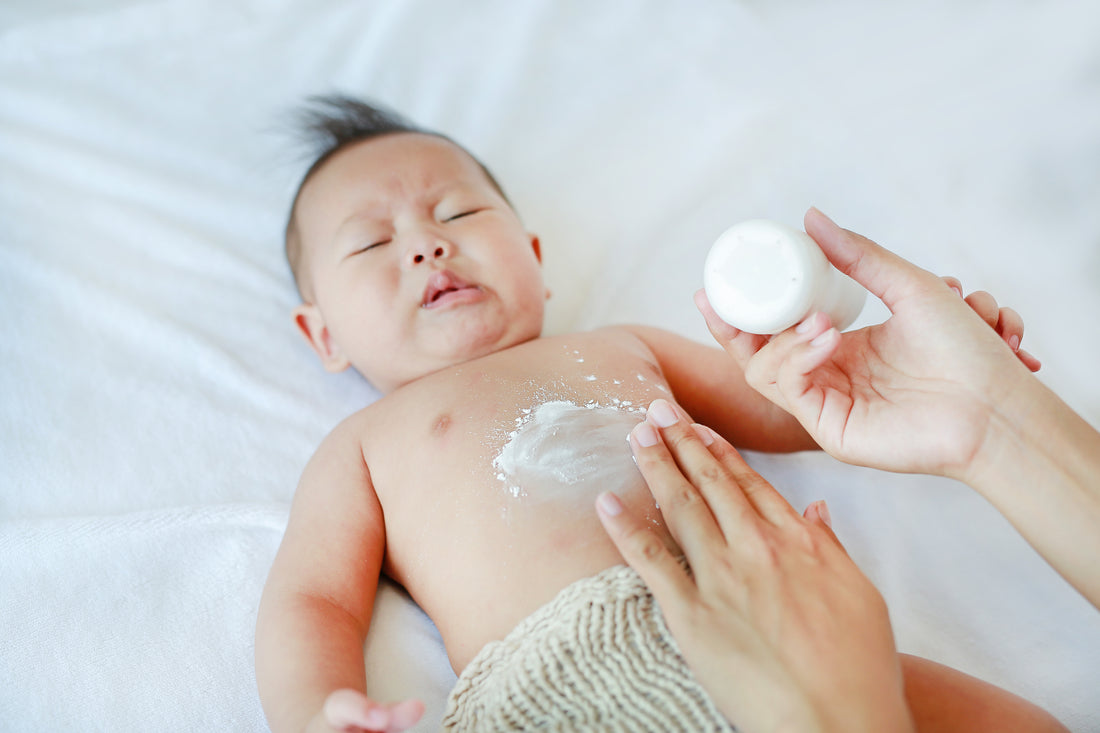
Is Talc Bad for Babies?
Share
Babies are known for their delicate skin and fragile immune system. Thus, it's no wonder that parents often fret (as they should!) over the kind of products that can be a part of their baby's daily skincare routine.
After all, it's important to ensure that only the safest ingredients make contact with your baby's skin. It's always best to consult a medical professional, such as a paediatrician or a dermatologist, to know what's safe for your baby and what isn't.
The topic of talc has been confusing parents for a while now. Although talc is a very common ingredient in makeup products such as blush, eye shadow, and face powder and personal hygiene products such as antiperspirants, many experts believe that it's better to avoid the use of talc-based products when it comes to infants and children.
However, talc is very closely associated with baby powder. So, what should a parent do? In this article, we will explore whether talc is unsafe for babies.
Is Baby Powder Safe? Is Talc Dangerous for Babies?
Most people around the world think of talcum powder when they see the words ‘baby powder.’ This is because a combination of talc and cornstarch has been used to make baby powder for several decades.
However, in recent times, the terms ‘baby powder’ and ‘talc’ have been generating a buzz, and not in a good way!
So, what is the deal with baby powder? Is talc good or bad for babies? Let's find out.
Why is Talc So Commonly Used?
Talc (or talcum) contains magnesium, silicon, oxygen, and hydrogen and is a naturally occurring clay mineral.

The softest mineral in the world, talc (i.e., cosmetic talc) has been a popular ingredient in the skincare, beauty, and makeup industry because it absorbs moisture quickly, is silky to touch, prevents caking, and makes the product opaque.
Is Talc Toxic? Can Talcum Powder Cause Cancer?
Since talc is highly absorbent, it is mixed with cornstarch and has been used for more than a century as a baby powder — many parents and caregivers think of it as being safe for babies.
Many adults also use baby powder in their genital area to combat wetness, rashes, and unpleasant odours.
However, there has been some debate about whether or not talc is truly safe for babies, and there are a few reasons why this question needs consideration.

First of all, the fine particles of talc can be very dangerous if inhaled. Inhalation of talc — which can happen if the container spills or if a curious child messes around with the open bottle of baby powder — can cause serious respiratory problems such as pneumoconiosis, and in extreme cases can even lead to death.
Thus, the American Academy of Pediatrics advises parents against using talcum powder for their babies. Additionally, the National Health Service (NHS) asks parents to not use talcum powder for nappy rash, as the product can have ingredients that can potentially irritate the baby's skin further.
Second of all, for decades, many researchers and medical professionals have been worried about a link between talc usage and cancer (particularly between talc and ovarian cancer in adults). So, is talc possibly carcinogenic?
Talc, which is mined from the earth, is often found near asbestos, a known carcinogen when inhaled (according to the World Health Organization's International Agency for Research on Cancer). However, research is ongoing and currently inconclusive when it comes to whether talc on its own can cause cancer in babies and adults.
Talc for Babies — To Use or Not To Use?
If you choose to use talc powder or talc-based baby powder, it's important to be aware of the potential risks involved.
As noted previously, talc that contains asbestos is likely to cause cancer in the long run if inhaled, but there is no strong evidence showing that asbestos-free talc can cause cancer.
Many baby powders rely on talc as one of their main ingredients, so, understandably, many parents feel confused and frightened. Unfortunately, if safety regulations are not followed strictly, asbestos-containing talcum can make its way into skincare, makeup, and baby care products.

Thus, most experts are of the opinion that it is better to avoid talc and talc-based products altogether when it comes to babies. After all, why risk it when there are safer alternatives?
In conclusion, although asbestos-free talc might be safe for babies, it is best to avoid baby products that have talc altogether.
Some medical professionals also advise against using cornstarch-based baby powders, since their very fine particles can cause respiratory illness if inhaled by children.
The Benefit of Organic Ingredients with Nature's Baby Organics
As a parent or caregiver, you'll be pleased to know that there are talc-free and cornstarch-free powders that can keep your baby's skin clean and dry without any risk to their overall health.
However, many of these safer alternatives still contain fragrances and chemical additives that can be harsh on your little one's skin. So, the best option here — and arguably, always — is to go natural all the way!
Nature's Baby Organics has a fantastic range of plant-derived, minimally processed, and cruelty-free baby care products that are specially designed keeping in mind the sensitive skin of babies and the allergies they commonly encounter.
Our Organic Silky Baby Powder (Fragrance Free) is USDA Certified Organic and made from organic tapioca starch, chamomile, aloe, and echinacea. No talc, no cornstarch, no fragrance! Just natural goodness.
Gentle enough for newborns, our silky dusting powder is ideal for dry, irritated, and sensitive skin and can even help to prevent and treat diaper rash. It effectively absorbs wetness and reduces chafing between skin folds, making it perfect for use between diaper changes or on hot, sweaty days.
Wait, there's more good news!
Nature's Baby Organics Organic Silky Baby Powder can be used by any member of the family and is suitable for people with sensitive skin. In fact, a number of elderly citizens prefer using our dusting powder because it is gentle and soothing on their aged, delicate skin.
So if you're sweaty and itchy, simply use our dusting powder to comfort and refresh your skin!
Check out our website today for other organic baby products that are good for your little one, you, and the planet.
